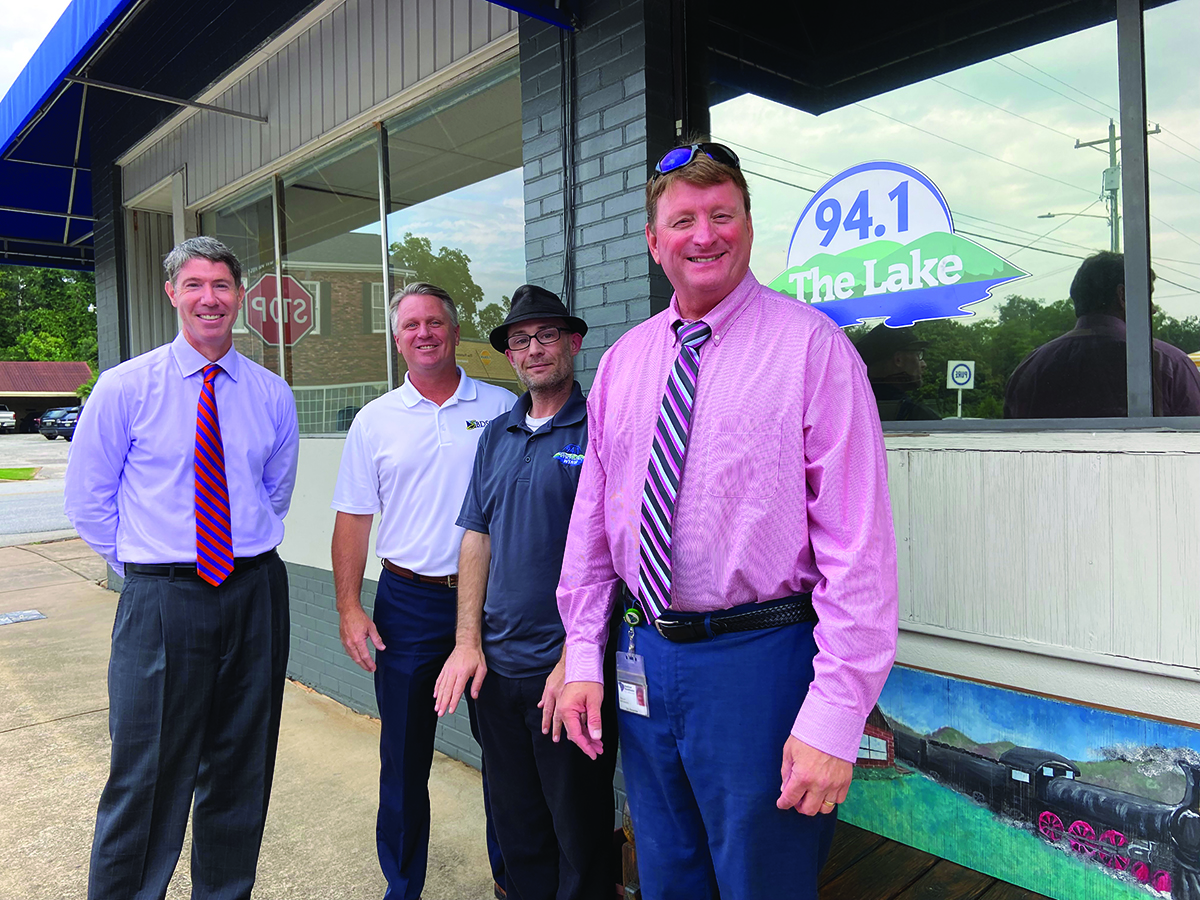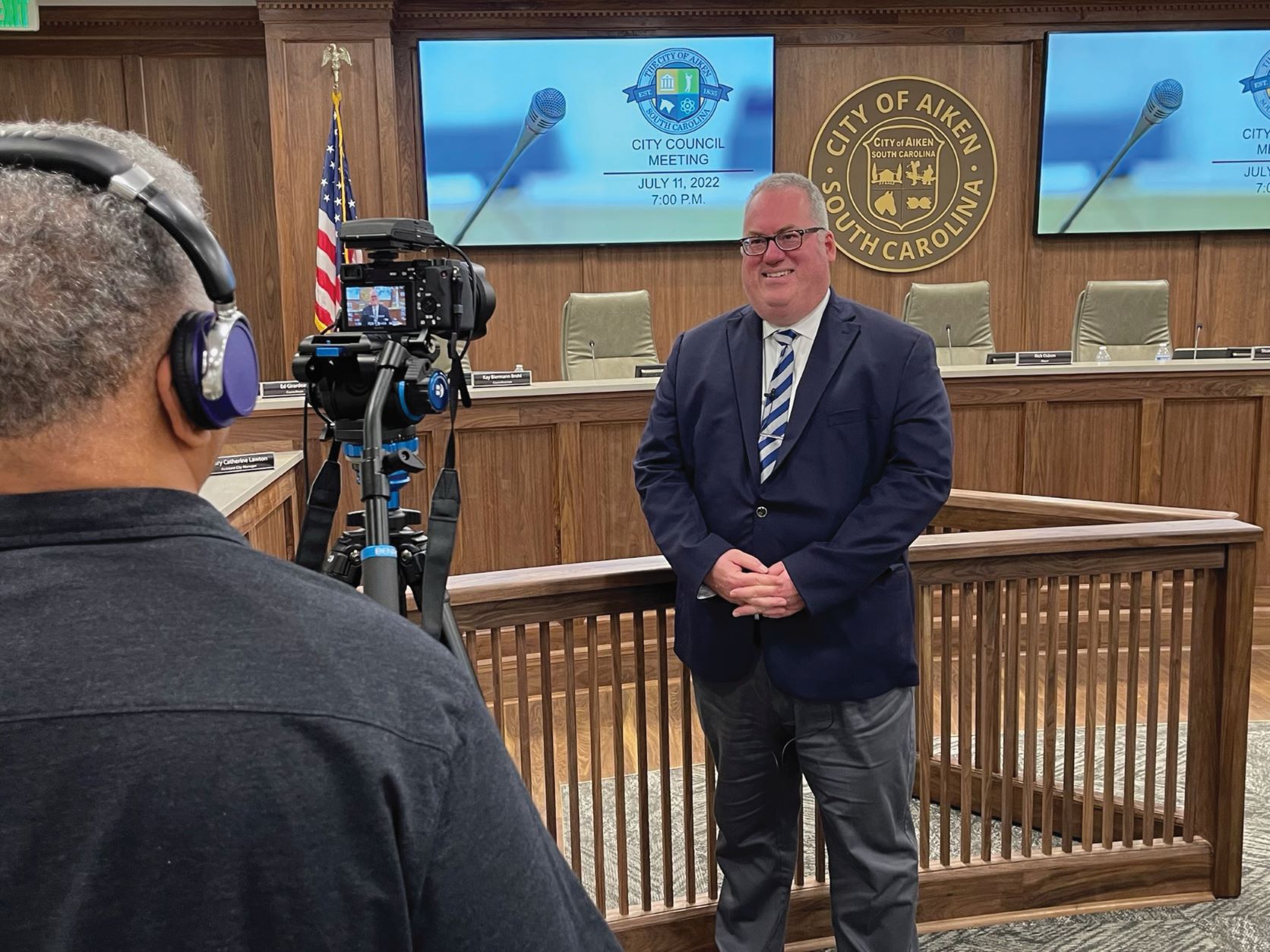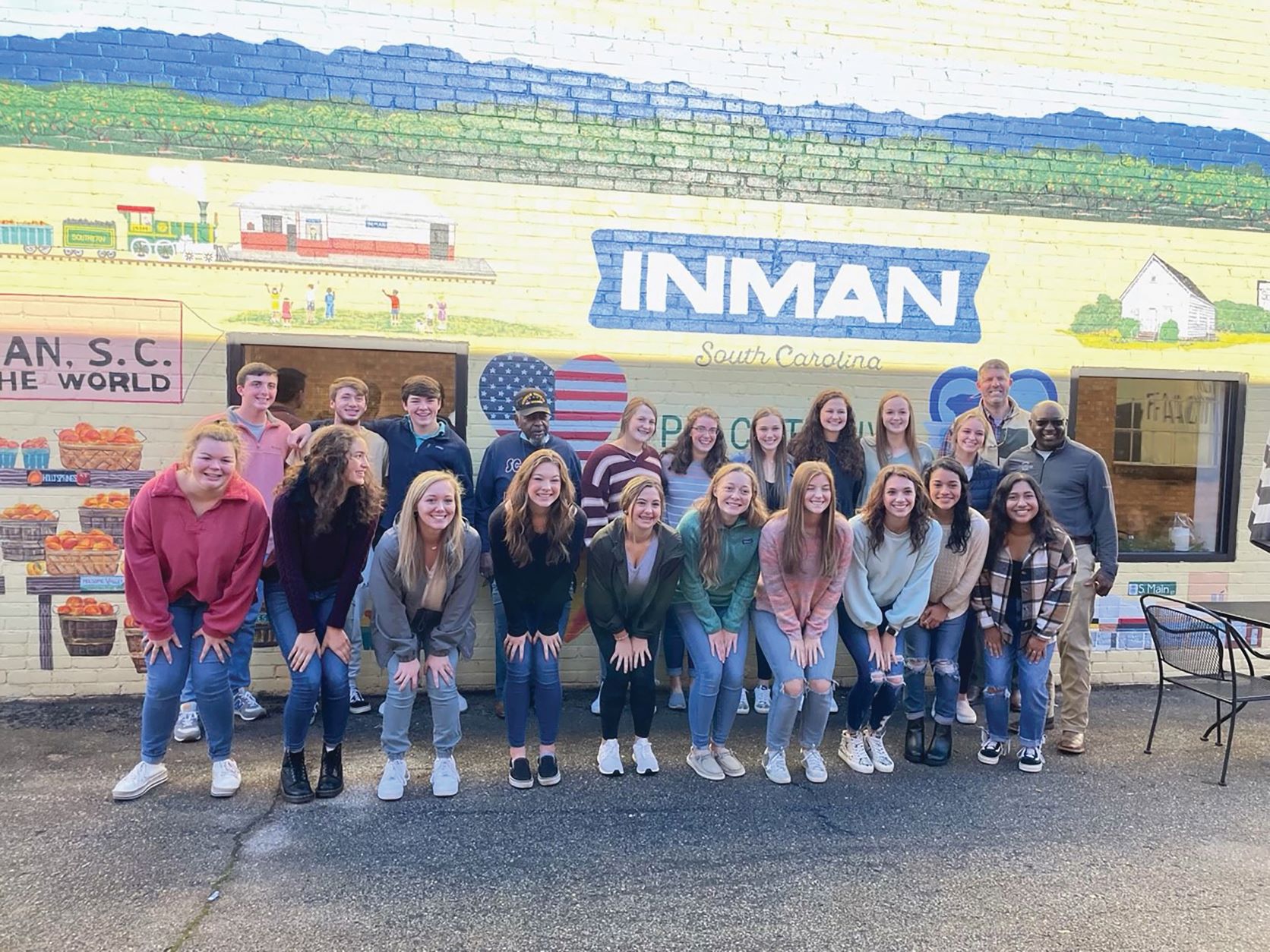Mayor Dan Alexander is well-known in Seneca, where he was born and raised. It’s also where he’s been mayor for 24 years after serving on city council for another 10 years.
And in case anyone in town doesn’t personally know him, they likely are familiar with his voice. For years, his “City Talk” show has been a fixture on the radio each Saturday morning. Broadcast from station 94.1 WSNW-The Lake in downtown Seneca, the program features Alexander along with city staffers and guests from nonprofits. Each month, Clemson Mayor Robert Halfacre joins Alexander on the show, and the two mayors talk about common issues facing the nearby municipalities.

The “City Talk” radio show connects the residents of Seneca and Clemson with their government.
From left: Clemson Mayor Robert Halfacre, Seneca City Administrator Scott Moulder,
Kevin Hollis of 94.1 WSNW-The Lake, and Seneca Mayor Dan Alexander.
Photo: City of Clemson.
“We wanted to come up with a way we could reach out to our community and have them involved,” Alexander said. “It’s a way to get the good news out about what’s happening in our community, the resources and the nonprofits that are out there.”
The radio show is one example of the importance of outreach to residents by city leaders. Whether through online videos or mentoring local students, cities depend on that personal touch to help everyone know their leaders and become more involved citizens.
For Seneca, that means the mayor talking about upcoming events like Jazz on the Alley, or the city administrator and other staff talking about downtown development, recreation or emergency services.
“People will say, ‘It was great to hear that on the radio,’ or ‘I appreciate you sharing the news about Seneca,’” Alexander said. “For me it’s about transparency and letting people know what’s going on. It allows all of us in the city to let the community know us better.”
Each Wednesday morning, Alexander is interviewed by a radio station reporter for a live 30-minute show. Segments from that are paired with other interviews for the hourlong “City Talk” show that airs on Saturday mornings.
Riley Johnson, Seneca’s events coordinator, said the program started in response to organizations and nonprofits coming to the city seeking funding.
“We said, we can’t give you money, but we can give you exposure. We can put you in front of people. If you’ve got a yard sale, a benefit, a fundraiser, we can give you the exposure to double the attendance,” Johnson said.
Johnson is responsible for putting the show together, managing the technology and booking guests.
“And what’s really cool is it lets the mayor be out there more than behind a desk making decisions at a council meeting. It’s a chance [for residents] to get to know him better. And people want to be on his show,” Johnson said.
In Aiken, City Manager Stuart Bedenbaugh keeps residents informed by recording a quick video for social media after each city council meeting.
“We wanted to do something that would fit in with the users of media today. Newspapers still have a market, but younger people and others now get their news from digital platforms,” he said.

Aiken City Manager Stuart Bedenbaugh records brief video updates on each city
council meeting after the meeting ends. Photo: City of Aiken.
Just after each meeting, Bedenbaugh puts on a mic and a staff member films him giving a quick recap of the council’s action. While the videos initially were posted immediately after the night meetings, he said the city learned more people viewed it if it was posted early the following morning.
“It’s primarily to keep people informed of what their elected officials are doing; so citizens will know we passed a budget or purchased a piece of property or we are doing a water line replacement,” Bedenbaugh said.
His advice to other cities: keep it short — Aiken’s videos are typically 45 to 90 seconds. He advised cities to cover as much ground as possible, without dwelling on any item, because the videos are aimed at casual news consumers.
Personal outreach also can help the city as well as its residents. Just ask Mayor Cornelius Huff in Inman.
When Huff became mayor in 2014, he hosted an open meeting to find out what residents thought was missing in the city. When he heard the youth of Inman had little connection with it, he visited all the schools, from elementary through high school.
“I got to the high school, and to them, Inman was stagnant, dead,” he said. “They said, ‘Why don’t you have us set up a council, a team to help you as the mayor?’”
The Inman Mayor’s Youth Council was born.

Inman Mayor Cornelius Huff established the Mayor’s Youth Council to learn from
students of Chapman High School, teach them about local government and provide
them with opportunities for civic engagement. Photo: City of Inman.
Huff teamed with the school district and developed an application for juniors and seniors at Chapman High School. Thirty-five applied the first year for 25 slots.
“It was amazing. I told them I’m going to teach you about government and you’re going to teach me what’s missing in our community and fix it,” Huff said.
It took off. The team started getting involved in the community, holding events downtown, creating community gardens, sprucing up downtown with murals, visiting nursing homes.
“They even went out and rallied to get a coffee shop. They wanted to hang out downtown. The first staple of downtown Inman was the coffee shop they worked to get. We went from 13 empty stores downtown to one empty building in just three years,” he said. “I tell people it stemmed from a strong city council and a youth council that made things happen.”
The students attend every city council meeting, and Huff even had students run a meeting.
“It’s amazing to watch them. Every child is not stuck on social media and video games. They want to learn if you give them your time,” he said.
Huff has taken the students to other cities around the state to share the message.
“I tell cities they can learn from us. We’ve got the wheel going. We can give you information on how it started, do’s and don’t’s,” Huff said.
It’s all part of the personal connection city leaders try to make through outreach to their communities.
Halfacre, who regularly joins the “City Talk” show in Seneca, noted that “nothing is more personal than holding public office in a small town or city.”
“My promise, as mayor of our great city, has always been to hear people and respond, championing honest and open conversations,” Halfacre said. “That means making ourselves available outside of a council meeting to hear from residents, taxpayers and business owners. Sometimes that also means speaking on a radio program or sharing information on social media. It means showing up in the places you’re least expected. And most important for us, it has been holding town halls — which we call ‘Conversations with Council’ — that involve us coming out into our community and inviting input in places beyond the four walls of our council chamber.”
Local government is the type of government closest to its residents, but municipal officials can still find new ways to connect personally with their constituents. Doing so, they can build better working relationships and make the governing process more accessible.
